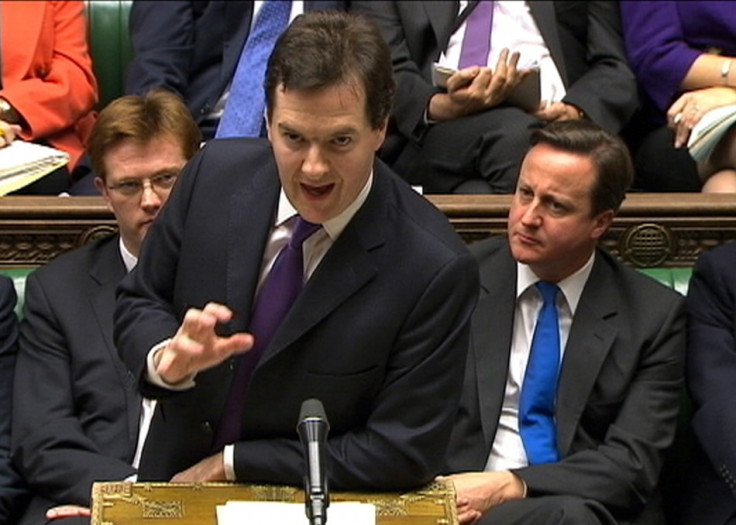Families' Spending Power 'Set to Dip'

Spending power of the average British family is going to dip over the next five years, due to rising inflation, salary freeze and cuts on welfare schemes by the government, a think tank has warned.
The Institute for Fiscal Studies (IFS) has predicted that average incomes will fall by three percent, taking into account the inflation, this year and in 2012.
"In the period 2009-10 to 2012-13, real median household incomes will drop by a whopping 7.4 percent, a record matched only by the falls seen between 1974 and 1977," said Paul Johnson, director of the IFS.
Chancellor George Osborne's autumn statement did not draw a great picture of the present and future of the economy. About 2 million public sector workers staged a walkout in protest against proposed pension reforms on Wednesday.
The policy institute warned that families with children will be worse off in 2016 than they were 14 years back as they cope with more than a decade of austerity.
In the 1970s due to the oil price shocks, the then Labour government had to borrow from the IMF and drastically reduce government expenses to survive. However, people's spending power improved within four years.
To prevent further deterioration of the international financial system, major central banks have announced joint urgent measures with a view to prevent the global economy from slipping into another phase of meltdown.
A Downing Street spokesperson has justified the emergency steps saying that they are necessary because the markets are under extreme strain. "We are experiencing a credit crunch and that central bank action is about trying to mitigate the effects of that credit crunch," he added.
Lower income groups will be worst affected by the government's cuts, as outlined by George Osborne on Tuesday. There would be two more years of austerity than originally planned in his March budget.
By slashing spending on welfare schemes, many critics believe that the coalition had shifted the burden of paying for the deficit on to the most vulnerable.
The Guardian writes that the IFS analysis of the UK's current economic concerns, and the coalition's reaction to them, both suggest that real median household incomes - where higher wages and salaries are adjusted to account for higher prices - will be no higher in 2015 than they were in 2002.
A couple with no children typically enjoyed a weekly income of £437 in 2002, but by 2015 that will have dropped in real terms to £433. For a couple with two children, the weekly income falls from £612 in 2002 to £606 in 2015. In the nine since 2002 the cost of living has increased 30 percent.
The IFS analysis revealed that the unemployed and pensioners living on state benefits would do better than working families after benefits were linked to the 5.2 percent rise in inflation.
"Failure to index some elements of tax credits, and the reversal of decisions to increase child tax credits in real terms, will leave some poorer families worse off and will lead to an increase in measured child poverty," Johnson said.
The IFS estimates are based on forecasts from the Office for Budget Responsibility, an independent office that oversees Treasury's expenses, and were produced in parallel with Osborne's statement.
The study blamed a surge in oil price shock as the single largest element fuelling an inflationary spiral that left many families worse off.
"Rather than further hammering consumer confidence with public sector pay caps and cuts in working tax credits, the government needs to put greater emphasis on wage-led growth, starting with a fairer tax system where everyone - including the super-rich - pays their share," TUC general-secretary Brendan Barber said.
The latest official data shows that UK families' weekly spending fell last year to the lowest in real terms for at least seven years. They cut back on spending on leisure to try to pay for housing, energy and transport costs.
Growth in wage for workers in Britain hit a record low between 2010 and 2011. Pay was up just 0.4 percent, a year ago, in terms of gross weekly earnings, meaning that incomes are falling in real terms, given that inflation stands at five percent.
The Office for National Statistics (ONS) noted that the gap between Britain's highest and lowest paid workers had widened dramatically over the past year.
Public sector workers are the one group whose incomes "are certainly being squeezed," the IFS report finds.
The gap between public and private earners is at 4.3 per cent for men, taking into account education, age and qualification levels. For women the public sector premium is 10.5 per cent and for both men and women it stands at 7.5 per cent.
The IFS also looked into differences in public sector benefits across the UK. "Looking at pay alone, public sector workers appear, on average, to do relatively badly in London and the south-east and really rather well in some other areas including Wales and the north of England," Johnson said.
Osborne also stressed that public sector pay review bodies should look into how pay can be made more responsive to local labour markets.
Following forecasts for further contraction at the end of 2011 and barely any growth next year, Osborne had to admit that the UK risked falling into recession. The chancellor went on to highlight substantial cuts on expenses for two more years to lower strain on public finances.
"That will extend to six years the period for which total spending will have been cut year-on-year," warned Johnson.
© Copyright IBTimes 2024. All rights reserved.





